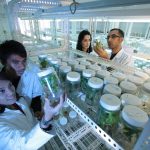Stress, “the silent killer” of the modern age, could finally become simple to detect and quantify. Researchers from the University of Cincinnati (UC) have developed a new test that can easily measure common stress hormones using sweat, blood, urine or saliva. The aim is to eventually have an accessible device that patients can use at home to monitor their health.
Stress has stealthy effects on everything from heart disease to mental health. According to the 2014 data, 77% of people in the US regularly experience physical symptoms caused by stress. If researchers use the results published in the journal American Chemical Society Sensors and develop the proposed stress-measuring device, people will gain a more accurate insight into their stress levels.
“I wanted something that’s simple and easy to interpret,” Andrew Steckl, an Ohio Eminent Scholar and professor of electrical engineering in UC’s College of Engineering and Applied Science, said for UC News. “This may not give you all the information, but it tells you whether you need a professional who can take over,” Steckl said.
UC researchers developed a device that uses ultraviolet light to measure stress hormones in a drop of blood, sweat, urine or saliva. The fact that the test measures multiple biomarkers is what separates it from the others. Stress biomarkers are found in all of these fluids in different quantities.
For years, Steckl and his colleagues from Nanoelectronics Laboratory have been studying biosensors. This latest journal article is part of a series of research papers his group has written on them. But personal experience gave Steckl the idea that a home test for various health concerns would be incredibly helpful.
“I had to take him (father) quite often to the lab or doctor to have tests done to adjust his medication. I thought it would be great if he could just do the tests himself to see if he was in trouble or just imagining things,” Steckl said. “This doesn’t replace laboratory tests, but it could tell patients more or less where they are.”
UC received grant funding for the project from the National Science Foundation and the U.S. Air Force Research Lab. Steckl said the military studies acute stress in its pilots and others who are pushing the edges of human performance. The head of mission would like to know when the soldier is reaching the end of their ability to control the mission and pull them out before a catastrophic ending. But Steckl has broader applications for the UC device in mind. With so many stressed out people, the commercial possibilities are promising.
“You’re not going to replace a full-panel laboratory blood test. That’s not the intent,” Steckl said. “But if you’re able to do the test at home because you’re not feeling well and want to know where you stand, this will tell whether your condition has changed a little or a lot.”
UC graduate Prajokta Ray and the study’s first author said she was excited to work on such a pressing problem for her PhD studies.
“Stress harms us in so many ways. And it sneaks up on you. You don’t know how devastating a short or long duration of stress can be,” Ray said. “So many physical ailments such as diabetes, high blood pressure and neurological or psychological disorders are attributed to stress the patient has gone through. That’s what interested me.”
Ray was always stressing about taking exams. Understanding how stress affects you individually could be extremely valuable, she said.
“Stress has been a hot topic over the past couple years. Researchers have tried very hard to develop a test that is cheap and easy and effective and detect these hormones in low concentrations,” she said. “This test has the potential to make a strong commercial device. It would be great to see the research go in that direction.”
UC has a great track record and big goals in biosensor technology. Its labs are examining continuous sweat testing and point-of-care diagnostics for numerous issues, including traumatic brain injury and lead poisoning. Steckl’s papers have been cited more than 13,000 times. In 2016 he made an interesting innovation. Using salmon sperm, a byproduct of the fishing industry, he replaced rare earth metals used in light-emitting diodes for a new kind of organic LED.
“We’re device engineers at heart,” Steckl said. “We don’t shy away from things we don’t know much about to begin with. We look for opportunities. That’s a hallmark of electrical engineers. We’re not smart enough not to go where we shouldn’t. Sometimes that pays off!”
Considering the pace of modern living, many would benefit from a device that you can use to check your stress levels. People tend to tell themselves they are fine when that is far from the truth.
Learn more about what harm stress does to the human body in the video below:
By Andreja Gregoric, MSc



